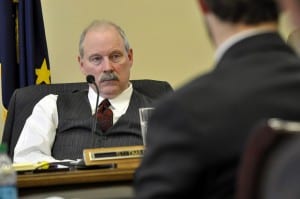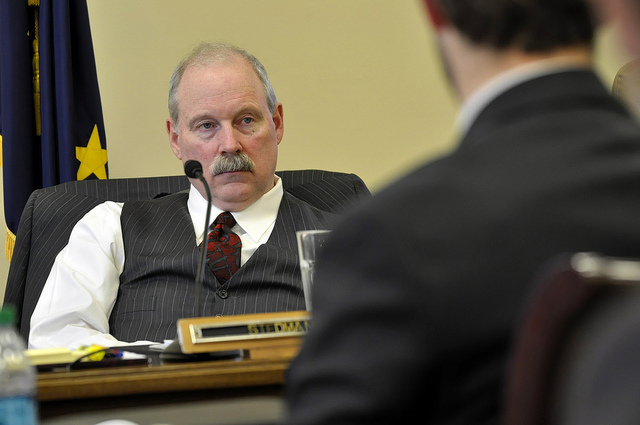Petersburg’s state legislators on both sides of the aisle expect to avoid a partial governmental shutdown next month by coming to agreement on a budget for the fiscal year that starts in July. Like other lawmakers, they are awaiting an agreement from a conference committee of three senators and three representatives, and say they’re having conversations behind the scenes to seek an end to the state budget impasse.
A budget compromise with support of majority and minority members passed the House in the waning days of last month.
“You know everyone sort of looked at it and said yep this is a fair document that works towards the middle and speaks to concerns from all sides,” said Sitka Democratic representative Jonathan Kreiss-Tomkins. However, the Senate did not agree to those changes and submitted a different version of the spending plan. That sent the measure approving next year’s funding levels for most state agencies and services to a six-person conference committee. It was a move that prompted Kreiss-Tomkins to send out an email apologizing on behalf of the legislature. “I am distressed and distraught,” he said. “It’s an abject failure of governance and no one deserves this. It’s been, it shouldn’t be this way and it should never happen again.”

Sen. Bert Stedman listens to testimony at a Senate Labor and Commerce committee meeting, Feb. 18, 2014. (Photo by Skip Gray/Gavel Alaska)
The difference in the house’s version of the budget and the senate’s version is tens of millions of dollars, with money added back in for education, state ferries, public broadcasting and other items. Those are items Kreiss-Tomkins said he wanted to be included in the budget.
Republican Senator Bert Stedman of Sitka notes it’s a small percentage but it adds to a bigger problem. “There’s requests in for an additional 15 million in expenditures to be added from the minority Democrats in the House,” Stedman said. “I think that’s a livable number. Although we’ve got, ending this month of June, this current fiscal year we’re expected to run roughly a four billion dollar deficit and an additional four billion dollar deficit, rounded off, starting July 1. So to keep continually adding expenditures to the state is questionable.”
Stedman, a member of the senate majority caucus, thinks the legislature should have cut the budget further and is talking about the reductions that will have to come next year. “It’s going to be challenging in an election year to reduce that budget when, in my opinion we need to reduce it $400-600 million, which would be about 10 percent of the deficit, an annual deficit,” he explained. “So 400 million might sound like a large number but it’s only 10 percent of this year’s deficit. So we’re not frankly even getting close to the budget reductions we’re gonna need to fix this problem.”
Stedman thinks it will take revisiting the oil tax structure along with budget cuts in order to close the deficit. “So this problem is not a one year issue. It’s going to go on for several years ‘til we get the revenue and expenditures matched up. And then after that we’re still gonna have the residual impact for several more years after that. So I’m guessing this financial situation the state has backed itself into is gonna last pushing a decade.”
Stedman was in Ketchikan and Sitka this month but said he would travel to Anchorage to vote on any agreement out of the conference committee. The senator said he’s on the phone several times a day working to get a conclusion to the budget standoff.
Meanwhile Kreiss-Tomkins is in Anchorage this month and said there are conversations behind the scenes to reach an end to the impasse. Like Stedman, he doesn’t think a partial shutdown will occur next month. “If it happens I may well just leave the legislature in disgust and search for a different way to try to contribute to the world,” Kreiss-Tomkins said, adding, “I hope most others feel that way.”
Both Kreiss-Tomkins and Stedman noted the discussion on a revenue solution has started with the governor’s retreat at the University of Alaska Fairbanks this month. Kreiss-Tomkins said he doesn’t know enough yet about the options to say what kind of solution he would support.
Besides a budget agreement, the two special sessions did not result in two other requests from the governor, passage of a measure on sexual abuse education in the schools, or expansion of Medicaid. Meanwhile the associated press reported the cost of the two special sessions so far is at least 430-thousand dollars.










